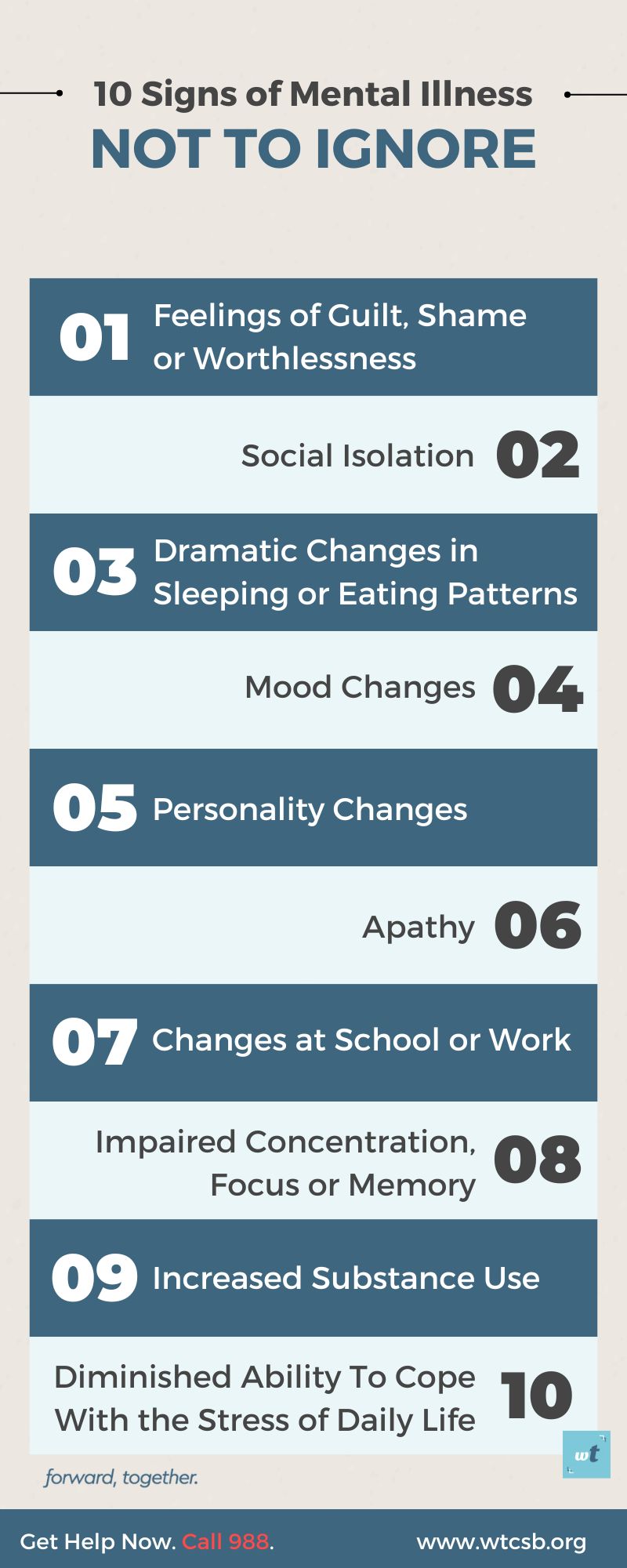This Suicide Prevention Month, we want to share resources that can help you to notice signs that someone is experiencing emotional distress and potentially contemplating suicide. If someone talks about suicide or wanting to die, you probably wouldn’t overlook it, but what about other signs that aren’t as obvious?
While it’s absolutely not your fault if someone you know dies by suicide, that doesn’t mean you shouldn’t try to be vigilant for signs and prevent suicide when you can. If someone you know is showing any of the following signs, do not ignore them. You might be the one to be there for them. You might prevent a suicide.
Related: Talking About Prevention
1. Feelings of Guilt, Shame or Worthlessness
If someone expresses feelings of guilt, shame or worthlessness, do not ignore it. These kinds of feelings are common in people who are thinking about suicide. Phrases like “I never do anything right,” “I’m worthless,” or “I’m a failure,” even if you think they’re said jokingly, can mean that the person is feeling that their life has no value or that they’re a burden to others.
2. Social Isolation
If a friend or family member suddenly or gradually isolates themselves from their social group, it’s probably a sign that something is wrong. We all need time alone sometimes, but extended isolation is usually a sign that a person is suffering. If someone keeps canceling plans or ignores or avoids other people for an extended time, do whatever you can to let them know they’re not alone. Check in on them regularly, encourage them to talk about what’s going on and talk to them about seeking help.
3. Dramatic Changes in Sleeping or Eating Patterns
Sometimes, we all experience insomnia or other sleep disruptions, but if someone in your life is sleeping way more or less than they used to, it might be a sign of depression or other risk factors for suicide. The same goes for eating changes. If someone is suddenly eating much more or less than usual, it could be linked to depression, anxiety, an eating disorder or stress – all risk factors for suicide.
4. Mood Changes
If someone is having persistent mood changes, it could be a sign of a mental health condition. This is especially true when the mood changes are dramatic or sudden. This can include getting angry or depressed over something that would normally be considered insignificant, like a minor inconvenience.
5. Personality Changes
If someone you know is exhibiting personality changes, pay attention. We all change throughout our lives, and a person’s goals and wants can change over time. It might even seem like they’re not the person you used to know. But if someone’s personality seems to change drastically over a relatively short period, they’re probably experiencing a mental health problem or another condition.
6. Apathy
If someone you know has stopped caring about the things they used to care about, it’s a major sign that they’re struggling with their mental health. Maybe they used to religiously watch football every week or loved to play video games, knit or paint and have suddenly stopped. Or they might have been involved with local or school sports, and have quit out of nowhere. A sudden change like this should always be looked into.
7. Changes at School or Work
A person dealing with a mental health condition will often exhibit a declining performance at work or school. They might also miss school or work more often or have difficulties with relationships with colleagues, teachers or fellow students.
8. Impaired Concentration, Focus or Memory
If an individual’s cognitive performance isn’t as good as it used to be, it might not seem like too much of a cause for concern, but the truth is that cognitive functioning is related to mental health. When someone is troubled by their thoughts and feelings, it often shows up as impaired concentration, focus or memory.
9. Increased Substance Use
Increased use of alcohol or drugs is often a sign of a mental health struggle. This is especially true if someone is suddenly using substances for the first time or starts to use them daily or in higher amounts than usual. If someone you know seems to be using substances to excess, or if it’s unusual behavior for them, don’t be afraid to ask about it. They may be using substances to cope with difficult feelings or experiences.
10. Diminished Ability To Cope With the Stress of Daily Life
If someone seems to be having increasing difficulties with handling the stresses of everyday life, it’s a major sign that something is wrong. They may suddenly find it hard to perform their everyday tasks, like job or household responsibilities or caring for themselves or their families.
Some signs of a lessened ability to cope with everyday life include:
- Laundry, dishes or other household chores piling up in the home
- Late or missed school or work assignments
- Feeling tired all the time
- Feeling overwhelmed
- Crying spells or bursts of anger
- Getting frustrated over little things
- Consistent feelings of stress, worry, fear or anxiety
- Consistent headaches or migraines
- Consistent muscle pain or tension or unexplained body pain
- Consistent digestive issues
How To Help Someone Who’s Thinking About Suicide
If someone you know is showing any of these signs, don’t hesitate to reach out to them. Let them know that you want to help and will not judge or shame them. Listen actively and give your advice, but only if they ask for your input. Offer to connect them with a mental health professional or a trusted loved one or community member.
Find a Community of Hope at WTCSB
Western Tidewater Community Services Board is your local, single-point-of-access for behavioral health services, but we’re more than that. We’re your community of hope and caring.
Our counselors are trained to provide compassionate, evidence-based and impactful care that rejects shame and stigmatization and instead encourages growth and healing.
If you or someone else needs mental health or substance abuse help, we’re here for you anytime. Call us at 757-758-5106 or request same-day access online.
Click infographic to enlarge.
Share the infographic - Click here for the embed code.
<img src=”https://www.wtcsb.org/wp-content/uploads/2023/09/10-Signs-of-Mental-Illness-not-to-ignore-1.jpg” /></a







